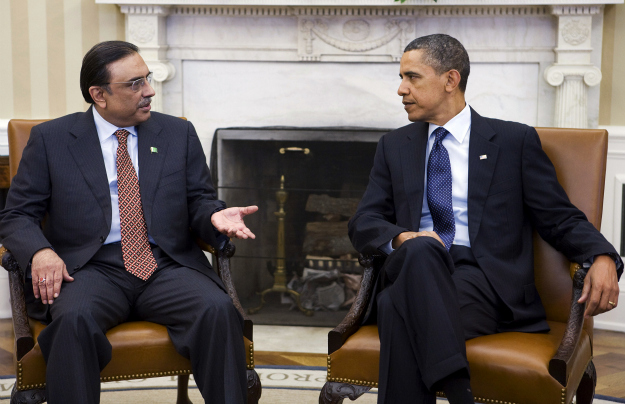
Make no mistake! The U.S.-Pakistan relationship is in its most fragile and vulnerable condition since the founding of Pakistan more than six decades ago.
Good and bad reasons have created a trust deficit that is still metastasizing. Operation Geronimo and the incursion deep into Pakistan by U.S. Navy SEALs that killed Osama bin Laden without permission or knowledge of Islamabad have supercharged the deep grievances, differences and contentious issues that divide Washington and its major, non-NATO ally.
Consider three different sets of circumstances — one real and the other two hypothetical — to understand better the often vast differences in the values, perceptions and interests of Pakistan and the United States as a vital step in finding ways to resolve what appear as intractable issues and divides.
Raymond Davis is the first case. In January, Davis killed two Pakistanis who he claimed threatened him in Lahore. A third died when a vehicle from the U.S. Consulate sent to rescue Davis went down the wrong way of a one-way street and collided with a motorcyclist. The United States immediately demanded Davis’ release claiming diplomatic immunity and threatening strong action if the demand wasn’t met.
The case dragged on for many reasons including Pakistan’s assessment that Davis had no immunity at the time because of an expired visa. Regardless of the facts, the Pakistan government at the highest level promised the United States that the case would be resolved but in a Pakistani way. The initial U.S. anger cooled as information became available on what to Pakistanis seemed to be a simple case of murder irrespective of diplomatic niceties.
Ultimately, a way around was found but on a Pakistani and not American timetable. The families of the dead Pakistanis were compensated and under Koranic law, absolved Davis. Davis was released. Strategic patience won out. The lesson is clear. Before a rush to judgment over the bin Laden affair, patience is essential on both sides.
Now suppose, the raid had failed and bin Laden wasn’t in residence. Or worse, suppose this was ruse and bin Laden was actually hiding elsewhere. The Obama administration would have been assailed from every direction. Memories of the Bay of Pigs in 1961 and Desert One, the failed attempt to free U.S. Embassy personnel held hostage in Tehran in 1980 would have filled the airwaves. Republicans would have had a field day asserting this was another example of Democratic incompetence. And the furor from inside Pakistan would have been explosive with likely demands that would have put the United States in an impossible position.
What was crucial here was Osama bin Laden. He was there; he was killed; and while the United States violated Pakistani sovereignty and more importantly didn’t trust its erstwhile ally to protect the intelligence until after the mission was accomplished, the certainty of the outcome made from an American perspective everything right.
The final hypothetical is the most provocative: It is 3 a.m. The president of the United States is awakened by a phone call from Raul Castro who says Cuban commandoes have just left U.S. territorial waters after snatching bin Laden from his hideaway in southern Florida. Further, Castro tells the president that Cuba is sending bin Laden to the International Court of Justice for trial.
Wow!
To some degree, how a president would react to that news is playing out in Pakistan over bin Laden. The notion of a real alliance has been shattered by keeping the raid secret from Pakistan. To many observers, that bin Laden could turn up at the home of Pakistan’s West Point and within 40 miles of Islamabad was either a result of incompetence or complicity. That the U.S. raid wasn’t detected by the Pakistani military was a devastating blow to the one highly respected institution in the nation on which the people could depend.
Despair, frustration and outrage coexist now in Pakistan and euphoria in America. So can the damage be repaired? Fortunately, both sides understand that it is in our mutual interests to set the relationship on an upward trajectory.
The United States must exercise patience as in the Davis case. Pakistan needs to understand that unlike the Davis case, this one must be settled on a mutual timetable and terms. The starting point must be a thorough, objective, complete and transparent civilian led investigation. That the Pakistan army has started its own investigation won’t be sufficient.
Crucially, the civilian leadership must reassert itself. President Asif Ali Zardari has no choice but to tell his army Chief of Staff Ashfaq Kayani that the fate of the nation hangs in the balance and what happens. Unless both the United States and Pakistan can resolve the huge differences and divides that separate us, both sides will suffer and suffer badly.
We are out of time.
Harlan Ullman is Senior Advisor at the Atlantic Council, Chairman of the Killowen Group that advises leaders of government and business, and a frequent advisor to NATO. This article was syndicated by UPI.
Image: obama-zardari.jpg
